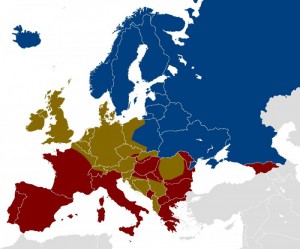- What’s it like being the only vet in a country? The BBC tells us.
- The CBD on how to be a good pastoralist.
- James does a mini-roundup of the India GM brinjal to-do.
- Mapping the fast food culture.
- Mexico wants Unesco to recognize culinary traditions. As if tamales were in danger of extinction. Didn’t France ask for the same last year?
- Heirloom chickens don’t taste like chicken.
- Deconstructing the cultural significance of the colour of corn.
- “GM crops: still not a panacea for poor farmers.” In other news, still no cure for cancer.
Mapping European alcoholic diversity
A map over at Strange Maps seems to suggest that the most diverse place in Europe in terms of drinks traditions is the area where Hungary, Romania and Ukraine — and thus the wine, beer and vodka belts — meet. Check it out:
But is it true? Have any of our readers been there? And can they recall anything about the visit?
Nibbles: Spud, Mali’s farmers, Pollan, Geneflow, Taiwan botanic garden, Pollinators squared, Vegetarianism
- A makeover for the potato.
- Mali’s farmers want improved landraces, not fancy-shmancy hybrids.
- Biofortified does Pollan. And Pollan does Oprah…
- The long-term consequences of introducing new genes to populations are not all that bad. Relevance for crop wild relatives? More research needed…
- The Dr. Cecilia Koo Botanic Conservation Center (KBCC) in Taiwan described.
- Almond tree produces poison in nectar to attract insects? Go figure. In other pollinator news, they’re declining in Central Europe.
- What would a world without domesticated livestock look like? ILRI DG questions vegetarians.
Doing well and doing good
The private sector can also have a positive impact on poor farmers – simultaneously enhancing food security by bringing them into procurement systems, a strategy that has the added advantage of giving corporate buyers a more diverse and therefore secure supply chain.
Want examples, check out the Financial Times report on Business and Food Sustainability.
Nibbles: GIPB, NPGS, Dogs for conservation, Harare gardens, Goat milk value added, Equator Prize, Humanitarian relief, Peruvian maize, Pseudo-cereals, Katine, Vavilov goes web 2.0, Travel, Haggis ban, African road datasets, Dyes, Adaptation pix, Baltic, AnGR, Jatropha
- GIPB revamps its website. Knowledge Resource Centre is ver. 4.0, no less.
- US National Plant Germplasm System explained to Canadians. Why? They have their own!
- Armadillo sniffing dogs.
- More urban farming in Zimbabwe.
- Interesting stuff you can make with goat milk.
- Who do you like for Equator Prize 2010? Avatar? No, wait, that’s something else. Well, actually…
- Nutrition for humanitarian workers.
- Large-eared white maize is ‘cultural heritage’ of Peru. So that’s all good then.
- Minor cereals and a gluten-free diet.
- Wanna talk to Katine? Ask about what the project is doing with/about agrobiodiversity, of course!
- Nikolay tweets!
- Agricultural and other assorted musings along the Mekong. Can’t help thinking that if you somehow aggregated all similar observations and geo-referenced them you’d come up with a pretty interesting picture of agriculture worldwide.
- A blow for Scottish agrobiodiversity and cuisine.
- Digitizing Africa’s roads.
- Natural dyes 101.
- IUCN photos of climate change adaptation. Includes agriculture! Well, sort of.
- Nordic agricultural scientists to discuss climate change adaptation. Grow bananas?
- Breeding Strategies for Sustainable Management of Animal Genetic Resources from FAO. Via.
- ATREE questions Jatropha.
